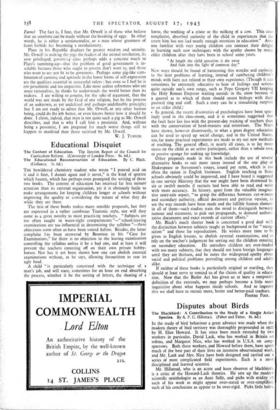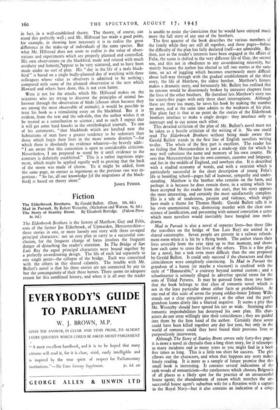Disputes about Birds IN the study of bird behaviour a
great advance was made when the modern theory of bird territory was thoroughly propounded in 1922 by H. Eliot Howard. It has since been much extended by two workers in particular, David Lack, who has worked in Britain on robins, and Margaret Nice, who has worked in U.S.A. on song- sparrows. Both these workers, and Howard before them, have spent much of the best part of their lives on intensive observational work, and Mr. Lack and Mrs. Nice have both designed and carried out 3 series of most complicated field experiments. Each is a most disciplined and learned scientist.
Mr. Hillstead, who is an acute and keen observer of blackbirds, is a critic of the Howard-Lack theories. He sets up the modern scientific ornithologist as an Aunt Sally, and picks with avidity, on such of his work as might appear over-stated or over-simplified. such of his conclusions as appear to be over-rigid. Picks little hole
in fact, in a well-established theory. The theory, of course, can stand this perfectly well ; and Mr. Hillstead has made a good point, for example, in showing how necessary it is to realise the great difference in the make-up of individuals of the same species. But what Mr. Hillstead does not seem to realise is the value of obser- vations and experiments which are properly planned and controlled. His own observations on the blackbird, made and related with much assiduity and honesty,`appear to be very scattered, and to have been made under no sort of plan. His " day in the life of a male black- bird " is based on a single badly-planned day of watching with three colleagues whose value as observers is admitted to be nothing ; compared with some of the planned observation at the nest which Howard and others have done, this is not even funny.
Were it not for the attacks which Mr. Hillstead makes on the scientists who are trying to discover the principles of animal be- haviour through the observation of birds (chosen often because they are among the most observable of animals), it would be possible to treat his book as a stimulating essay on the blackbird. But it is evident, from the text and the sub-tide, that the author wishes it to be treated as a contribution to science ; and as such I expect that it will get some hard knocks in the ornithological journals. To one of his statements, "that blackbirds which are hatched near the habitations of man have a greater tendency to be sedentary than those which begin their lives in the more remote districts "—for which there is absolutely no evidence whatever—he bravely adds: " I am aware that this contention is open to considerable criticism. Nevertheless, I am prepared to stand by it until evidence to the contrary is definitely established." This is a rather ingenious argu- ment, which might be applied equally well to proving that the back of the moon was made of cheese. To it might be added, from the same page, an extract as ingenuous as the previous one was in- genious : " So far, all our knowledge [of the migrations of the black- bird] is based on theory alone."
JAMES FISHER.



























 Previous page
Previous page